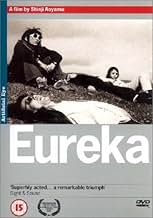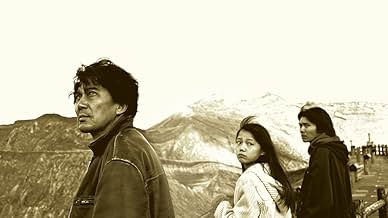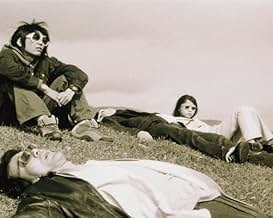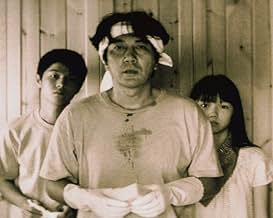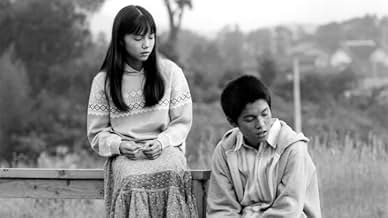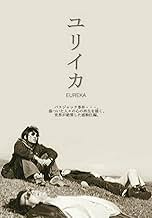Yurîka
- 2000
- 3h 37min
PUNTUACIÓN EN IMDb
7,7/10
4,6 mil
TU PUNTUACIÓN
Los traumatizados sobrevivientes de un secuestro en un autobús se unen para un viaje por la carretera para intentar superar su yo dañado. Mientras tanto, un asesino en serie anda suelto.Los traumatizados sobrevivientes de un secuestro en un autobús se unen para un viaje por la carretera para intentar superar su yo dañado. Mientras tanto, un asesino en serie anda suelto.Los traumatizados sobrevivientes de un secuestro en un autobús se unen para un viaje por la carretera para intentar superar su yo dañado. Mientras tanto, un asesino en serie anda suelto.
- Premios
- 4 premios y 2 nominaciones en total
Reseñas destacadas
Amazing film. The reviews posted - at the time of this writing - on the IMDb page are sad, because I don't think the writers were ready for what kind of movie it is. (Stephen Holden's pan in the New York Times is especially foolhardy and thoughtless.) It helped to have a little advanced word, in order to brace myself. As it stands, it should have defeated "Dancer in the Dark" at Cannes last year, handily. And if I see a better movie this year, it'll be something for the history books.
It's not for the faint of heart. It's three hours and thirty-seven minutes long, in black and white, and in Japanese. And it's very slow-moving. The cinematography is beautiful, but that may not be enough for folks to hack through nearly four hours.
But the extreme length and slowness is not unjustified. It opens with a horrifying, traumatic event that provides an emotional undercurrent that informs the remainder of the story, in much the same way as "Saving Private Ryan" did (let that not discourage the anti-Spielbergers), and as the film progresses, the event becomes a memory, part of the characters' and ours, too. And the slowness isn't really slowness - it's the playing out of events and interactions as they would happen in real time (the story spans a few months, I believe, perhaps even a year, and maybe more).
"What's the freaking story?" I hear you ask...well, here goes. The opening sequence, which will undoubtedly inspire comparisons and contrasts to "The Sweet Hereafter" (as will the entire film), shows the hijacking of a commuter bus by a businessman pushed over the edge. As the scene unfolds, he has already killed a few passengers, the police are surrounding the bus, and he has used newspapers to block all the windows.
Without revealing too much, the bus driver and two teens - a brother and a sister - survive the incident. The driver (Koji Yakusho, star of "Shall We Dance?" and "The Eel") is shaken deeply, and leaves his brother and parents to wander. The youths' mother runs off with another man, and their father dies soon after in an auto accident - with insurance payments, they can live, but there is no one to watch over them.
I could go into more of the plot - and most critics will, I'm sure - but that isn't really necessary. The key to the movie is that the events seem to be played out as they would in real life, and that the movie camera just "happens to be there" to catch them and tell the story. Sure, this is the goal of all narrative films, but with "Eureka," the process seems to have been reinvented and renewed. The film is longer than most, but not a moment is wasted; it's one of the most efficiently edited movies I've ever seen. Every shot, nuance, glance, spoken word, everything has a reason for being.
There are some who say the movie is too somber, too gloomy. It isn't really. It's somber, sure, but it doesn't strain for it. There is humor - deadpan, mostly - and great joy, too. And if you love great cinema, there is even greater joy!
It's not for the faint of heart. It's three hours and thirty-seven minutes long, in black and white, and in Japanese. And it's very slow-moving. The cinematography is beautiful, but that may not be enough for folks to hack through nearly four hours.
But the extreme length and slowness is not unjustified. It opens with a horrifying, traumatic event that provides an emotional undercurrent that informs the remainder of the story, in much the same way as "Saving Private Ryan" did (let that not discourage the anti-Spielbergers), and as the film progresses, the event becomes a memory, part of the characters' and ours, too. And the slowness isn't really slowness - it's the playing out of events and interactions as they would happen in real time (the story spans a few months, I believe, perhaps even a year, and maybe more).
"What's the freaking story?" I hear you ask...well, here goes. The opening sequence, which will undoubtedly inspire comparisons and contrasts to "The Sweet Hereafter" (as will the entire film), shows the hijacking of a commuter bus by a businessman pushed over the edge. As the scene unfolds, he has already killed a few passengers, the police are surrounding the bus, and he has used newspapers to block all the windows.
Without revealing too much, the bus driver and two teens - a brother and a sister - survive the incident. The driver (Koji Yakusho, star of "Shall We Dance?" and "The Eel") is shaken deeply, and leaves his brother and parents to wander. The youths' mother runs off with another man, and their father dies soon after in an auto accident - with insurance payments, they can live, but there is no one to watch over them.
I could go into more of the plot - and most critics will, I'm sure - but that isn't really necessary. The key to the movie is that the events seem to be played out as they would in real life, and that the movie camera just "happens to be there" to catch them and tell the story. Sure, this is the goal of all narrative films, but with "Eureka," the process seems to have been reinvented and renewed. The film is longer than most, but not a moment is wasted; it's one of the most efficiently edited movies I've ever seen. Every shot, nuance, glance, spoken word, everything has a reason for being.
There are some who say the movie is too somber, too gloomy. It isn't really. It's somber, sure, but it doesn't strain for it. There is humor - deadpan, mostly - and great joy, too. And if you love great cinema, there is even greater joy!
10aapp22
During its epic 3,5 hours of duration I managed to make some coffee, fry some eggs and let me assure you that I was a totally different man when it ended - It made me think about the real meaning of life, its beauty and subsequent horrors which we all go through at some point in our existence.
This is sophisticated film-making at its best.
This is sophisticated film-making at its best.
Some people have a disliking for Japanese cinema because the movies tend to be slow paced, minimalistic. If you're one of them - skip EUREKA is all you need to know. The movie moves along at a snail's pace on Sunday - at 90 minutes most movies are just coming to their explosive and or dramatic climax, but at that point I was still wondering what Eureka was about. 2 hours later the movie finally finishes - and I was still wondering what it was all about.
EUREKA is a movie of epic length, that raises other challenging questions like "Why is it 3.5 hours long?", "Why is it black and white?", "Is this all going somewhere?" and "Is it nearly finished yet?". Clearly director Shinji Aoyama wants his movie to make us think. And in 3.5 hours of black and white imagery and minimal dialogue, your mind certainly does have ample opportunity to wander.
Maybe I should have checked the "Director's Statement" that is included on the UK DVD before watching the movie. Then I'd have known what he was trying to say, and could have spent my time deciding if he said it effectively instead. Whether that would have been more fun or less I don't know though.
Not to say that I didn't enjoy watching EUREKA - for most of the run time I did. It's very well acted, has some good cinematography and is generally quite unusual. I'd have preferred it to have been shorter though, or had more going on - even colour photography would have helped to keep my attention on the screen with a little less effort.
I do think it's a good movie though, but... it just didn't need to be 3.5 hours to make its point or build its characters. Or maybe it did need 3.5 hours to do that, but Shinji Aoyama used his time badly - because at the end I still didn't really have a grasp on who the characters were 'deep down', or what the point of sharing their story with us was. Perhaps it's just that it's a movie aimed for better minds than mine to truly appreciate though. Certainly the length and style are going to keep any hopes of mainstream appreciation at bay.
EUREKA is a movie of epic length, that raises other challenging questions like "Why is it 3.5 hours long?", "Why is it black and white?", "Is this all going somewhere?" and "Is it nearly finished yet?". Clearly director Shinji Aoyama wants his movie to make us think. And in 3.5 hours of black and white imagery and minimal dialogue, your mind certainly does have ample opportunity to wander.
Maybe I should have checked the "Director's Statement" that is included on the UK DVD before watching the movie. Then I'd have known what he was trying to say, and could have spent my time deciding if he said it effectively instead. Whether that would have been more fun or less I don't know though.
Not to say that I didn't enjoy watching EUREKA - for most of the run time I did. It's very well acted, has some good cinematography and is generally quite unusual. I'd have preferred it to have been shorter though, or had more going on - even colour photography would have helped to keep my attention on the screen with a little less effort.
I do think it's a good movie though, but... it just didn't need to be 3.5 hours to make its point or build its characters. Or maybe it did need 3.5 hours to do that, but Shinji Aoyama used his time badly - because at the end I still didn't really have a grasp on who the characters were 'deep down', or what the point of sharing their story with us was. Perhaps it's just that it's a movie aimed for better minds than mine to truly appreciate though. Certainly the length and style are going to keep any hopes of mainstream appreciation at bay.
It has been almost 6 years since I saw this film, yet this film can stick with me and still offer me things.
After a tragic incident of violence, a bus driver tries to find two other teen-aged survivors, a brother and sister. The sparse black and white camera work provide an insight into the bleak emotional landscape as they just stumble through as "walking dead". Having lost a father, I can identify with the characters. What is touching is the lack of communication and dialogue between the actors (whic includes the lead of the Japanese "Shall We Dance" ). Yet there is love and communication made even by just the thumping on bus walls. Words fail them.
The camera work is bleak yet stunning in composition and texture. Minimal yet just enough to feel the principals trying to find meaning in life. One can also speak of the Japanese economic downturn and the resulting introspective dramatic films such as Hirokazu's "After Life". If have experienced grief or if you'd like to find some insight into it, this may be a film. It seemed shorter than the four hours, but you are forewarned.
After a tragic incident of violence, a bus driver tries to find two other teen-aged survivors, a brother and sister. The sparse black and white camera work provide an insight into the bleak emotional landscape as they just stumble through as "walking dead". Having lost a father, I can identify with the characters. What is touching is the lack of communication and dialogue between the actors (whic includes the lead of the Japanese "Shall We Dance" ). Yet there is love and communication made even by just the thumping on bus walls. Words fail them.
The camera work is bleak yet stunning in composition and texture. Minimal yet just enough to feel the principals trying to find meaning in life. One can also speak of the Japanese economic downturn and the resulting introspective dramatic films such as Hirokazu's "After Life". If have experienced grief or if you'd like to find some insight into it, this may be a film. It seemed shorter than the four hours, but you are forewarned.
Probably the only thing that has happened to me which i cannot express in words. Maybe thats what the director 'Shiniji' felt and instead of trying to express is it in heavy-Hollywood-dialogs syndrome, he chose the absolutely pinnacle and quintessential form of communication- ...... If you are looking for the definition of that art, you wouldn't just find,because it doesn't exist. You have to see this movie to venture into the world which is way beyond cinema and story-telling.
Each character has just defied the very fabric of artificial situations that are cinematic and have stepped into the horizons of real world much real that what we see now. Shiniji's brilliance is not only in the way he picked up the situation and silhouetted it with ever so beautiful backdrop but also in that fact that he hasn't compromised on the lines of letting the movie talk with its aura of silence. Many great directors would have been tempted to use the brilliant characters of Naoki and Kozue to speak up their frustration(a usual ploy in American and European Cinema) to reassure their directorial capabilities, but Shiniji's belief in the movie and its characters was much more intense than both his audience and himself.
Now a little about the movie. Eureka centrally addresses the condensed emotions of people who go through a catastrophe which might not be fatal physically but is absolutely draining mentally. The eventual darkness of body and mind that leads such people to imagine heinous crimes like murder without knowing the true essence of its legitimacy. It deals with complete disintegration of human psyche to unwanted darkness. But it also shows the inevitability of human victory of life and happiness over death and darkness. Eureka tours the human road-map of complete disillusionment and back to reclaim its lost grounds.
Naoki and Kozue though being kids display a true situation that can drive even kids to craziness. Though not being dumb, words have not been their respite. The killing emptiness within woven with their apathetic vocals drilled them to their core and they became immune to popular practice of existence. Talking and involving with others were a waste, for nothing in the world could bring them what they lost. And if you ask what they lost, they cant describe it, I cant describe it, and neither can Shiniji. We can only feel it.
Makoto together with the kids was also a subject to the catastrophe. It hit him so hard mentally that he lost himself to isolation. But he regrouped and returned to his home just to find that things have changed around him, he could not justify but accepted it because he could find himself a reason to it. He visits the kids and they form a small family in which no one has to say that they care for each other, they just have to feel.
I can go on for this movie for the rest of my life but if you are alive you will see it.
Each character has just defied the very fabric of artificial situations that are cinematic and have stepped into the horizons of real world much real that what we see now. Shiniji's brilliance is not only in the way he picked up the situation and silhouetted it with ever so beautiful backdrop but also in that fact that he hasn't compromised on the lines of letting the movie talk with its aura of silence. Many great directors would have been tempted to use the brilliant characters of Naoki and Kozue to speak up their frustration(a usual ploy in American and European Cinema) to reassure their directorial capabilities, but Shiniji's belief in the movie and its characters was much more intense than both his audience and himself.
Now a little about the movie. Eureka centrally addresses the condensed emotions of people who go through a catastrophe which might not be fatal physically but is absolutely draining mentally. The eventual darkness of body and mind that leads such people to imagine heinous crimes like murder without knowing the true essence of its legitimacy. It deals with complete disintegration of human psyche to unwanted darkness. But it also shows the inevitability of human victory of life and happiness over death and darkness. Eureka tours the human road-map of complete disillusionment and back to reclaim its lost grounds.
Naoki and Kozue though being kids display a true situation that can drive even kids to craziness. Though not being dumb, words have not been their respite. The killing emptiness within woven with their apathetic vocals drilled them to their core and they became immune to popular practice of existence. Talking and involving with others were a waste, for nothing in the world could bring them what they lost. And if you ask what they lost, they cant describe it, I cant describe it, and neither can Shiniji. We can only feel it.
Makoto together with the kids was also a subject to the catastrophe. It hit him so hard mentally that he lost himself to isolation. But he regrouped and returned to his home just to find that things have changed around him, he could not justify but accepted it because he could find himself a reason to it. He visits the kids and they form a small family in which no one has to say that they care for each other, they just have to feel.
I can go on for this movie for the rest of my life but if you are alive you will see it.
¿Sabías que...?
- CuriosidadesThe brother and sister in the film are played by real life brother and sister Aoi Miyazaki and Masaru Miyazaki.
- Citas
Makoto Sawai: Do you think one can live only for others?
Selecciones populares
Inicia sesión para calificar y añadir a tu lista para recibir recomendaciones personalizadas
- How long is Eureka?Con tecnología de Alexa
Detalles
- Fecha de lanzamiento
- Países de origen
- Sitios oficiales
- Idioma
- Títulos en diferentes países
- Eureka
- Empresas productoras
- Ver más compañías en los créditos en IMDbPro
Taquilla
- Recaudación en Estados Unidos y Canadá
- 49.388 US$
- Recaudación en todo el mundo
- 49.388 US$
- Duración
- 3h 37min(217 min)
- Color
- Mezcla de sonido
- Relación de aspecto
- 2.35 : 1
Contribuir a esta página
Sugerir un cambio o añadir el contenido que falta

